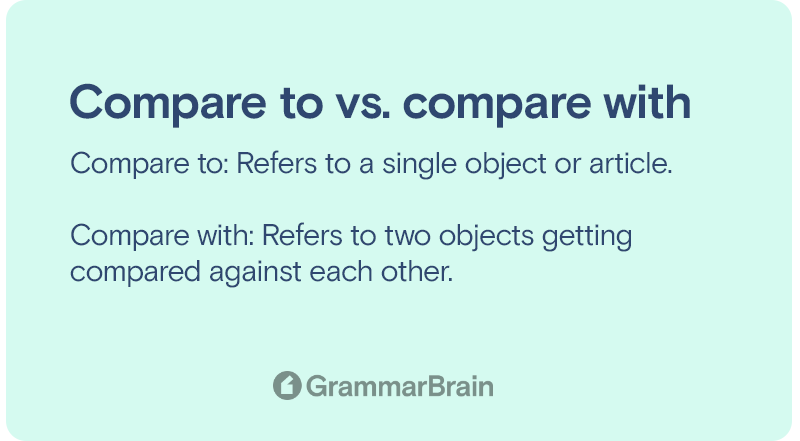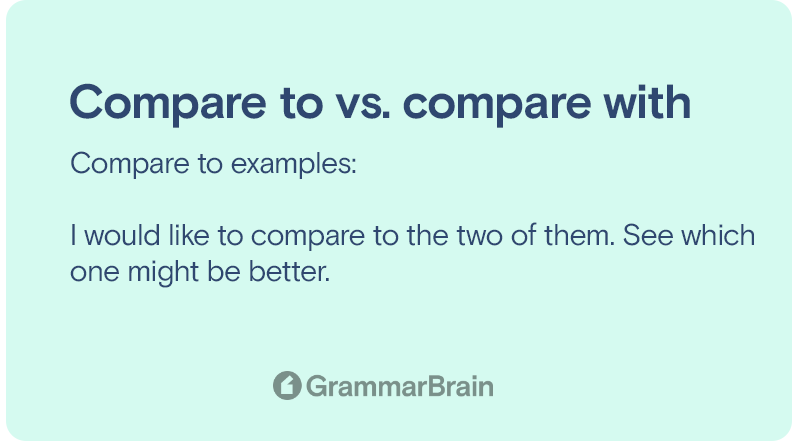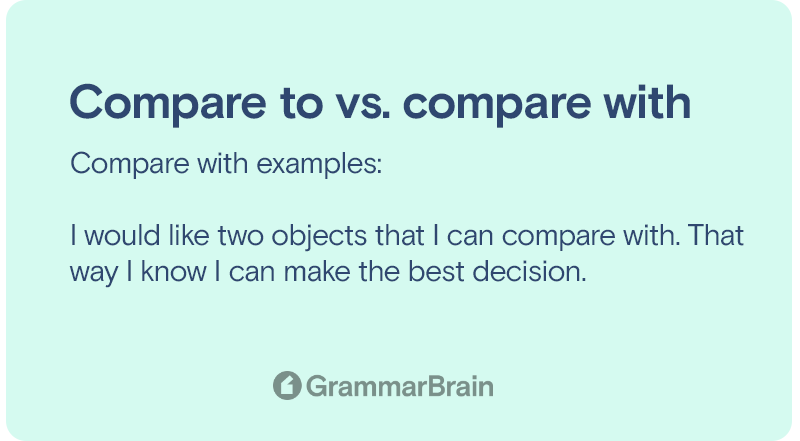In American English grammar, “compare to” and “compare with” are used to compare unrelated and related entities. The preposition “to” or “with” is frequently used with the words “compare” or “compared” in English. How do we choose which to use when both are grammatically acceptable?

What is “Compare To?”
When two things are compared, they are compared to separate things. The user highlights similarities between the two seemingly unrelated things in these various groupings.
The phrase “compare to” is used when comparing two distinct or unrelated objects. He compared the depths of the ocean to her eyes.
Here, the preposition “to” emphasizes a resemblance between two distinct entities.
The ocean is a sea, while human eyes are actual physical parts. They are very different things, but something makes them comparable. These two items are connected by color.
Example:
Emily does not like to compare herself to her elder sister.
Nick and Josh both play differently. You can not compare them to each other.
Compared to other hunting dog breeds, the Beagle has a lower intellect level.

What is “Compare With?”
Typically, the phrase “compared with” refers to two similar objects. The user describes the differences between the two comparison objects in this comparable sequence.
The verb “compare with” compares two similar-looking or comparable objects. She compared, for instance, her songs with those of the original vocalist. The word “with” is used in this situation to emphasize the commonalities between two different objects. The same song is performed by two different singers in opposition to one another. The unit of similarity, in this case, is the “song.”
It’s also possible to show similarities and differences using the expression “compare with.” The song in the example above is the same, but two different performers have sung it. The quality of the singing and voice, therefore, differ from one another.
Example:
You can not compare mangoes with oranges.
Monalisa is the best. There is no other art to compare with it.
My teacher always compared me with Siera, who used to get better grades.
Poodles require more grooming compared with Labradors.

Difference Between “Compared To” and “Compared With”
These expressions are employed in slightly different settings, even though they both signify a comparison of characteristics between two or more things.
The words “compared with” and “compared to” are used to contrast comparable and dissimilar items.
With “compare,” you can use either “with” or “to.”
Although there is a slight difference in meaning, both are correct—the difference between “compared to” and “compared with” is slight but essential.
“Compared to” highlights a similarity between two things.
“Compare with” suggests that the differences between two things are at least as important as the similarities. “Compared with” does the opposite: it contrasts them.
Which form to use
“Compare with” can get used to stress differences between two things that are of the same order. For example, “Compare with cats, dogs, and lizards.” Like in Shakespeare’s play (Sonnet 18), he states, “Shall I compare thee to a summer’s day?”
The origin of “compare to” and “compare with” don’t deviate from this original use. Both phrases are used to compare objects (usually two objects at a minimum) regarded as similar to each other (or having slight distinction).
In review
The term “compare to” is used to consider the similarities and contrasts between two things. It denotes weighing or balancing one thing against another when used with the word with.
It suggests that two things are comparable when combined with the preposition to.
Children frequently compare things to assert that two different entities have notable similarities.
“Compare with” is usually a younger, less challenging act than comparing with. “Comparing with” involves research frequently and requires objectivity.
FAQs
What is another word for compared to?
The synonyms of compared to are:
- In contrast with
- In comparison with
- In contrast to
- By contrast etc.
Is compare to grammatically correct?
Yes, compare to is grammatically correct. For example, “She was quite good in comparison to other contenders,” the meanings of “compared with” and “compared to” are virtually identical.
What is the difference between “to” and “with”?
‘To’ refers to just one individual, whereas ‘with’ refers to both.
What type of phrase is “compare with?”
The term “Compare with” is a verb. Comparing means examining anything to find parallels and differences between two or more things, ideas, individuals, etc., comparing two articles of clothing, and contrasting two countries’ governments.
Inside this article
Fact checked:
Content is rigorously reviewed by a team of qualified and experienced fact checkers. Fact checkers review articles for factual accuracy, relevance, and timeliness. Learn more.
Core lessons
Glossary
- Abstract Noun
- Accusative Case
- Anecdote
- Antonym
- Active Sentence
- Adverb
- Adjective
- Allegory
- Alliteration
- Adjective Clause
- Adjective Phrase
- Ampersand
- Anastrophe
- Adverbial Clause
- Appositive Phrase
- Clause
- Compound Adjective
- Complex Sentence
- Compound Words
- Compound Predicate
- Common Noun
- Comparative Adjective
- Comparative and Superlative
- Compound Noun
- Compound Subject
- Compound Sentence
- Copular Verb
- Collective Noun
- Colloquialism
- Conciseness
- Consonance
- Conditional
- Concrete Noun
- Conjunction
- Conjugation
- Conditional Sentence
- Comma Splice
- Correlative Conjunction
- Coordinating Conjunction
- Coordinate Adjective
- Cumulative Adjective
- Dative Case
- Determiner
- Declarative Sentence
- Declarative Statement
- Direct Object Pronoun
- Direct Object
- Diction
- Diphthong
- Dangling Modifier
- Demonstrative Pronoun
- Demonstrative Adjective
- Direct Characterization
- Definite Article
- Doublespeak
- False Dilemma Fallacy
- Future Perfect Progressive
- Future Simple
- Future Perfect Continuous
- Future Perfect
- First Conditional
- Irregular Adjective
- Irregular Verb
- Imperative Sentence
- Indefinite Article
- Intransitive Verb
- Introductory Phrase
- Indefinite Pronoun
- Indirect Characterization
- Interrogative Sentence
- Intensive Pronoun
- Inanimate Object
- Indefinite Tense
- Infinitive Phrase
- Interjection
- Intensifier
- Infinitive
- Indicative Mood
- Participle
- Parallelism
- Prepositional Phrase
- Past Simple Tense
- Past Continuous Tense
- Past Perfect Tense
- Past Progressive Tense
- Present Simple Tense
- Present Perfect Tense
- Personal Pronoun
- Personification
- Persuasive Writing
- Parallel Structure
- Phrasal Verb
- Predicate Adjective
- Predicate Nominative
- Phonetic Language
- Plural Noun
- Punctuation
- Punctuation Marks
- Preposition
- Preposition of Place
- Parts of Speech
- Possessive Adjective
- Possessive Determiner
- Possessive Case
- Possessive Noun
- Proper Adjective
- Proper Noun
- Present Participle
- Prefix
- Predicate



